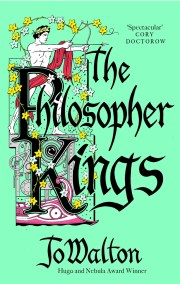‘Here in the Just City you will become your best selves. You will learn and grow and strive to be excellent.’
One day, in a moment of philosophical puckishness, the time-travelling goddess Pallas Athene decides to put Plato to the test and create the Just City. She locates the City on a Mediterranean island and populates it with over ten thousand children and a few hundred adults from all eras of history . . . along with some handy robots from the far human future.
Meanwhile, Apollo – stunned by the realization that there are things that human beings understand better than he does – has decided to become a mortal child, head to Athene’s City and see what all the fuss is about.
Then Socrates arrives, and starts asking troublesome questions.
What happens next is a tale only the brilliant Jo Walton could tell.
One day, in a moment of philosophical puckishness, the time-travelling goddess Pallas Athene decides to put Plato to the test and create the Just City. She locates the City on a Mediterranean island and populates it with over ten thousand children and a few hundred adults from all eras of history . . . along with some handy robots from the far human future.
Meanwhile, Apollo – stunned by the realization that there are things that human beings understand better than he does – has decided to become a mortal child, head to Athene’s City and see what all the fuss is about.
Then Socrates arrives, and starts asking troublesome questions.
What happens next is a tale only the brilliant Jo Walton could tell.
Newsletter Signup
By clicking ‘Sign Up,’ I acknowledge that I have read and agree to Hachette Book Group’s Privacy Policy and Terms of Use
Reviews
Jo Walton is one of science fiction's most versatile, thoughtful, and gripping writers . . . [A novel] about philosophy, history, gender and freedom [which] also manages to be a spectacular coming-of-age tale that encompasses everything from courtroom dramas to sexual intrigue.
Jo Walton [is] utterly brilliant.
An extraordinarily ambitious achievement . . . The Just City is a glorious example of one of the primary purposes of speculative fiction: serving as a map to the potentials and miseries of a possible world.
The award-winning Walton has written a remarkable novel of ideas that demands - and repays - careful reading. It is itself an exercise in philosophy that often, courtesy of Socrates, critically examines Plato's ideas . . . the plot is always accessible and the world building and characterization are superb. In the end, the novel more than does justice to the idea of the Just City.
Walton shines, as she always does, in the small and hurtful and glorious business of interpersonal relationships.
Rendered with Walton's usual power and beauty.


